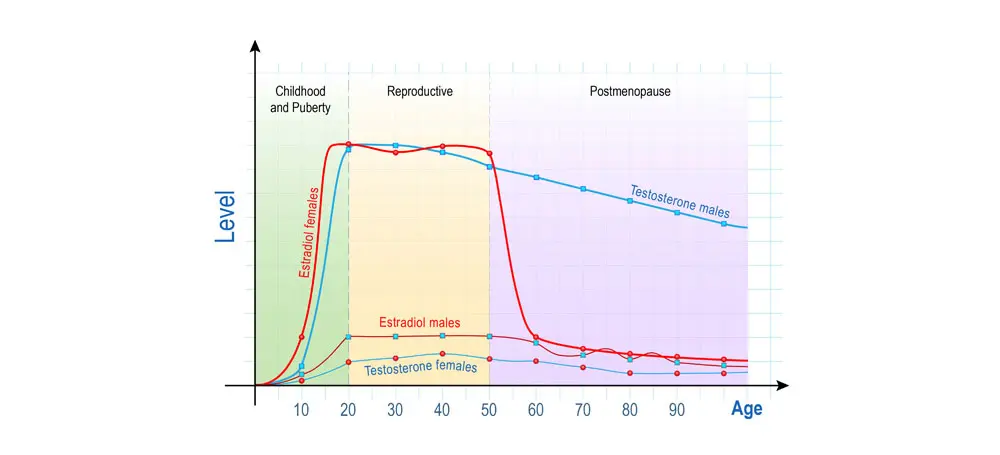Your libido is all tied up with your interest in sex. And yes, that interest can ebb and flow. You don’t always feel like sex when your partner does, and sometimes you’re just not in the mood.
However, if you find that your sex drive is low much of the time, you may be concerned. What’s more, you may be noticing a symptom of an underlying health condition.
While low libido can have many causes, one of the prime drivers of this problem is low testosterone. If your testosterone levels aren’t what they should be, you may be experiencing erectile dysfunction, a low sex drive and other symptoms that keep life from being all that it can be.
The good news is that treatments are available for low testosterone levels here in Boston, Massachusetts. Let’s look at how testosterone and your libido are intimately connected so you can understand what your options are.
The Role of Testosterone in Your Body
To understand how testosterone interacts with your sex drive, it’s important to know what testosterone is and what it does. As the primary male sex hormone, testosterone drives puberty, turning boys into men as their penis and testicles develop, their voice deepens, and they start to grow pubic hair and facial hair.
In adult men, testosterone is vital to the building of muscle mass and strength, bone density and strength, and sperm production. It also fuels your sex drive, and it plays a role in your overall mood. It’s vital to red blood cell production and, of course, it’s what enables you to achieve and maintain an erection.
Testosterone is produced in the testes when these organic receive a message from the pituitary gland. Your brain monitors the amount of testosterone in your bloodstream, letting the pituitary gland know when it’s time to slow down testosterone production.
The Relationship Between Testosterone and Your Libido
Libido varies significantly between one man and the next. One man might be bothered by what he considers a low sex drive, while another man might consider that level of libido perfectly satisfactory. Libido also changes over time, reaching a peak in the early 20s and slowly declining over the years.
The exact relationship between testosterone and libido is still a bit of a mystery to scientists. While the mechanism by which testosterone levels affect libido isn’t fully understood, there’s no denying that a decreased sex drive and erectile dysfunction are very often symptoms of low testosterone. Recent studies have shown a link between sex drive and testosterone levels, with lower testosterone levels found in the men who reported low libido. If testosterone levels drop low enough, a decline in sex drive is pretty much guaranteed.
Normal testosterone levels run from 300 to 1,000 nanogram per deciliter (ng/dL), according to the American Urological Association. However, testosterone decreases in most men as they age. Men can expect their testosterone level to drop about 1% per year beginning in their 30s.
While this is happening a protein called sex hormone-binding globulin increases, contributing to the reduction of free testosterone in the blood.
Once a man’s testosterone measures lower than 300 ng/dL, he can be diagnosed with low testosterone. About 40% of men in their 40s and older show low testosterone levels, according to the Cleveland Clinic. As a result, they may experience low libido, erectile dysfunction and infertility.
Other Factors That Influence Libido
While low testosterone levels must be diagnosed to receive some treatments, your libido can be affected by many other factors. These include:
- Injuries to and infection of the testes
- Testicular cancer
- Chemotherapy and radiation treatments
- Disorders of the pituitary or hypothalamus glands
- Genetic diseases, notably hemochromatosis and Klinefelter syndrome
- Use of anabolic steroids or corticosteroids
- Use of opioid pain relievers (including oxycodone and morphine) and antidepressants
- Other medications, including Tagamet (a heartburn remedy) and ketoconazole (an anti fungal drug)
- Restless leg syndrome
- Depression and anxiety
- Other mental health issues, including low self-esteem and PTSD
- Cardiovascular conditions, including high blood pressure and high cholesterol
- Type 2 diabetes
- Obesity
- Sleep apnea
- Overexercising and lack of exercise
- Excessive alcohol and/or drug use
- Smoking
In addition, stress affects most men’s libido. It disrupts hormone levels and narrows arteries — and those restricted arteries allow less blood flow to the penis, contributing to erectile dysfunction. Whether the stress stems from relationship problems, pressure at work or financial worries, it can affect libido temporarily or on a long-term basis.
Low Testosterone and Erectile Dysfunction
Low testosterone is one of the key factors associated with erectile dysfunction. The inability to get or maintain an erection is actually a result of diminished blood flow to the penis. This can be caused by hardening of the arteries, or atherosclerosis, a disease that’s associated with aging. Atherosclerosis is in turn associated with smoking, diabetes, high blood pressure and high cholesterol.
While not all men who experience erectile dysfunction show evidence of low testosterone in blood tests, about a third of them do. For many men, a self-perpetuating feedback loop develops around erectile dysfunction. An instance of erectile dysfunction can lead to anxiety and conflicts with a man’s sexual partner — and these in turn lead to greater erectile dysfunction.
Other Symptoms of Low Testosterone
Testosterone deficiency produces other symptoms in addition to erectile dysfunction and a diminished sex drive. If you are experiencing any of these co-occurring symptoms, you should get your testosterone levels checked:
- Reduction in facial and body hair
- Loss of muscle mass and strength
- Irritability and loss of concentration
- Low energy level
Another effect of low testosterone levels is loss of bone strength. Men with low testosterone levels can develop osteoporosis, which puts them at risk for fractures. Unfortunately, this is not a condition with obvious symptoms — until you break a bone. Bone density tests can help determine if you have osteoporosis or are at risk for it as a result of low testosterone levels.
When To See a Doctor About Low Libido
Since libido can ebb and flow, it can be tough to tell when it’s time to see a doctor about it. If you find your sex drive markedly diminished for several weeks, even when you’ve had the opportunity and stimulus to let your libido flourish, it might be time to get some testing done.
A doctor can look into the reasons for your low libido or reduced sexual function, all while keeping an eye out for related symptoms that may help paint a clear picture. Getting your issues treated starts with getting a diagnosis that you can trust.
A simple blood test can help ascertain whether you’re dealing with low testosterone. From there, your doctor can help you understand what your options are and guide you to the one that’s right for you. Make sure to get your testosterone levels tested in the morning when natural levels of the hormone tend to be at their highest.
Testosterone Replacement Therapy
If you are diagnosed with low testosterone, your next discussion is likely to focus on the appropriateness of testosterone replacement therapy. Testosterone replacement therapy helps with more than low libido and erectile dysfunction. It also helps you build muscle mass, lose body fat, and face your day with less irritability and anxiety.
You have several options available when seeking testosterone replacement therapy. You can receive testosterone through your skin by means of a skin patch (similar to a nicotine patch) or by applying gel every few days, usually to your upper arm.
Testosterone injections keep your hormone levels healthy for several weeks. These can be administered at your doctor’s office, or you can learn how to give yourself the injections. Some men prefer to receive testosterone therapy via pellets that are placed under the skin of the buttocks, where they release testosterone gradually over a period of several months.
Complementary Ways To Boost Your Libido
Treating low libido is often about more than just checking out your testosterone levels since low sex drive can have many contributing factors. Depending on the results of your blood tests, you may want to take some of these steps in place of or along with testosterone replacement therapy:
- Watch your diet. In particular, obese men with Type 2 diabetes can boost their libido by cutting calories and following a high-protein, low-fat diet.
- Get some exercise. Sexual performance is improved with an exercise regimen that includes 200 minutes per week of aerobic activity.
- Cut back on alcohol, drugs and tobacco. Quitting or cutting back on these substances can help improve libido.
- Be vulnerable with your partner. Instead of trying to tough it out, talk with your sexual partner about your issues. Try to rediscover and rejuvenate your relationship with touching and fantasizing, and keep the communications channels open.
- Lose weight. Men with less abdominal or belly fat show increased sexual desire. Losing weight can help put less pressure on your blood vessels as well, potentially clearing up blood flow issues affecting your erections.
- Check your medications. Many prescription and even over-the-counter medications list loss of sexual desire as a potential side effect. Talk to your pharmacist about your medications, and then have a discussion with your doctor to see if switching out medications might make a difference.
- See a therapist. All sorts of issues affect your sex drive, including psychological and emotional factors. If you’re dealing with stress resulting from the loss of a spouse, financial difficulties, unemployment or retirement, you’re more likely to experience low sexual desire. Talking to a therapist can make a big difference in getting your sex life back on track.
We Can Help
At Boston Vitality, we can help you figure out the reason for your loss of libido or erectile dysfunction and get you back on the right path to sexual health. We are the foremost expert in men’s health in Massachusetts, and our world-class, board-certified urologist, Dr. Michael Zachareas, has treated thousands of men for hormonal issues, including low testosterone. We are ready to help men in Boston understand what’s happening to their body and fight the effects of aging and low testosterone.
We offer all types of testosterone replacement therapy to help you push back against the adverse effects of low testosterone. We’ll run all the tests to measure your hormone levels, and we’ll listen to your symptoms to help make an accurate diagnosis. If testosterone replacement therapy is the right choice for you, we offer testosterone injections, testosterone gels and testosterone pellets. That means you can receive the type of therapy that makes the most sense for your lifestyle and comfort level.
Contact Boston Vitality today at 781-399-LowT (-5698) to schedule a consultation. There’s no need to go through life feeling like you’re missing out. Today could be the day that turns your life around and helps rejuvenate your life, returning you to the energy level, mental clarity, physical strength and, yes, sexual drive that you’ve been longing to experience again.


